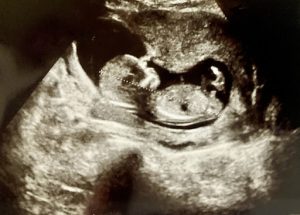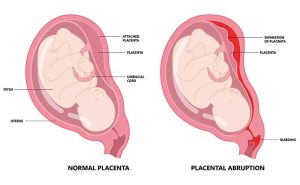Summary of this article
Stomach cramps during pregnancy are present throughout the entire pregnancy, but are particularly felt in the very early to early stages, and calm down somewhat in the middle trimester. In the second trimester, abdominal distension may occur again. Causes of abdominal distension include pre-term labour, cold, fatigue/stress, tightness of the abdomen, constipation/gas/urine, fetal movements, twins, sexual activity and uterine fibroids. If bleeding or severe pain accompanies the condition, there is a high possibility of an abnormality and you should seek medical attention as soon as possible.
Introduction
During pregnancy, you will be sensitive to small changes in your abdomen. Everyone feels differently, such as tingling or a feeling of a protruding belly.
The way your stomach feels will also change depending on the time of pregnancy. Many pregnant women may worry about what it feels like to have an upset tummy, which only they know what it feels like. This section explains the causes of an upset stomach and how to deal with it.
What does ‘belching’ feel like?
During pregnancy, the ‘feeling of a tight belly’ is said to be caused by the uterus itself getting bigger and the various ligaments that support the uterus being pulled when the uterus expands, and the feeling of the tingling is known as tension. Many pregnant women may not know what it feels like or what the sensation is, but it can be felt gradually.

The period when your stomach is upset
Stomach distension can be divided into two main categories.
- Physiological abdominal upset
- Danger signal that some kind of trouble is occurring
The abdomen is said to be tense throughout the entire pregnancy, but it is felt most frequently in the very early to early months of pregnancy, when the uterus is growing rapidly, and it settles somewhat in the second trimester, after which it is felt again in the last trimester of pregnancy.
Ultra-early stage of pregnancy
Most abdominal distension in very early pregnancy is a physiological phenomenon. It can be considered one of the normal pregnancy processes. At first, you may not know what an upset tummy feels like or what it feels like. It may be described as a ‘pain’ or a ‘protrusion’.
Early pregnancy
The ‘feeling of a tight belly’ in early pregnancy often feels as if the whole of the belly button, navel and lower abdomen is tense. If there is a ball-like hardness in the lower abdomen when the belly feels tight, it should be noted that the uterus may be contracting. It is recommended to consult a hospital.
NIPT can be taken from early pregnancy
In early pregnancy, you may experience a great deal of stress because you are worried about whether your baby is healthy. Stress is one of the causes of an upset stomach. If you are worried about just having a general routine check-up, you can have a test such as NIPT. NIPT can be done as soon as the pregnancy is confirmed by an ultrasound, so you can find out about your baby’s condition earlier.
Mid-pregnancy
In the second trimester of pregnancy, when the placenta in the uterus is complete, the abdominal distension generally begins to settle down. If the abdomen is frequently tense or lasts for a long time, there may be a problem and it is recommended to see a doctor as soon as possible.
Post-pregnancy
In late pregnancy, as the belly grows, the uterus contracts due to the baby’s lower position and the strain on the lower back and lower abdomen. This is felt as abdominal distension. The baby is moving in the abdomen day and night. The baby moves around in the abdomen, kicking and turning, which is another cause of a distended abdomen.
Causes of abdominal distension
The following are some of the causes of abdominal distension.
- Imminent premature birth
- Chilling exposure
- Fatigue, stress
- Tightening of the stomach
- Constipation, gas, urine
- Nipple massage
- Fetal movement
- Twins
- Sexual intercourse
- Fibroid
- Other, unknown cause
Imminent premature birth
In imminent premature birth, abdominal distension occurs frequently between 22 and less than 37 weeks’ gestation. The most common subjective symptoms are abdominal cramps, lower abdominal pain, bleeding and water breaking. If the distension or pain persists regularly or frequently, even with rest, see your obstetrician for advice at an early stage.
Chilling exposure
If the body is cold, the abdomen may become upset. Keep your legs and stomach warm by adjusting the temperature in the room or using a jacket or blanket.
Fatigue, stress
Tiredness and stress can cause an upset stomach. If you feel tired from work, housework, exercise or childcare, you need to take it easy and rest with the help of your family and others. If you feel stressed, try to consciously rest and change your mood.
Tightening of the stomach
Wearing a belly band or clothes that do not fit you may tighten your abdomen without you knowing it. You may need to adjust the belly band to see what kind of strength feels most comfortable. Changing into loose-fitting maternity clothes may also help to reduce tension.
Constipation, gas, urine
Pregnancy tends to cause constipation, which can lead to an upset stomach. You may also feel an upset stomach when your stomach is full of gas or when you urinate. Pregnancy tends to cause frequent urination, but you may also feel an upset stomach after urinating.
Nipple massage
Stimulation of the nipples releases hormones that stimulate uterine contractions. If nipple massage causes strong abdominal cramps, stop the massage temporarily and resume it after a short interval of time.
Fetal movement
As the baby grows larger in the abdomen, the irritation caused by movement may cause the abdomen to become tight. Fetal movements may also be felt as tummy tensions.
Twins
Twins are high-risk pregnancies and the size of the abdomen varies. Twin pregnancies are more likely to cause abdominal distension because of the rapid growth of the abdomen.
Sexual intercourse
Sexual intercourse is usually possible if there are no problems during the antenatal check-up. You may feel your abdomen during sexual intercourse. If you feel any tension, try to relax.
Fibroid
Pregnancies complicated by fibroids are more likely to cause abdominal distension. Pregnancy may also cause fibroids to grow larger and cause pain.
Other, unknown cause
Some abdominal upsets have no known cause. If you feel an upset, lie down, sit down or try to rest. In fact, there is no clear evidence that rubbing your stomach improves an upset stomach, but this does not mean you should not rub it. However, avoid rubbing with too much force.
Frequency of abdominal distension
If your stomach is upset more often than usual, if the upset does not get better with rest, or if you are repeatedly upset at regular intervals, you may be experiencing some kind of abnormality. It is a good idea to count how many times a day your stomach is normally upset in order to compare it with abnormalities.
See a doctor if you have any of these symptoms
It may be difficult to determine whether it is physiological or caused by illness. If in doubt, contact your obstetrician and ask for instructions, such as a medical examination.
Bleeding
You may be unsure whether a small amount of bleeding warrants a call or visit to a hospital. Tummy upset and bleeding can be handled differently depending on the time of pregnancy.
Ultra-early pregnancy~The first trimester
Very early pregnancy to early pregnancy bleeding can lead to miscarriage. Bleeding can vary from brown discharge, light pink or red bleeding. Causes of bleeding in early pregnancy include polyps and erosions as well as miscarriage. If you are concerned about even a small amount of bleeding, contact.
Mid-pregnancy
Bleeding in mid-pregnancy can lead to polyps, erosions and impending premature labour. It is advisable to consult an obstetrician even if the bleeding is small. If you feel an upset stomach, you can first rest and wait and see if the symptoms subside, but if there is bleeding or the upset stomach does not subside, you should see a doctor.
Up to 37 weeks of pregnancy
From 37 weeks of pregnancy, the baby is ready to be born. During this period, there is a possibility of a sticky pink to red haemorrhage known as a ‘Udder’. In the case of a ‘wince’, you can wait and see what happens.
However, if there is a large flow of blood or red bleeding, it may be an emergency bleed such as early abruption of the normal placenta, placenta previa or pre-eclampsia. Be sure to contact.

Tension is not subsiding
To determine whether it is a physiological contraction of the uterus or not, lie or sit down for an hour or so and see what happens. If the tension still does not go away, there may be something wrong. If it is difficult to determine this yourself, contact a hospital.
In the second trimester of pregnancy, the abdomen may suddenly become tickly and the pain may become more and more intense. This may be due to a condition called ‘premature separation of the normal placenta’, in which the placenta detaches from the uterus. If this is the case, you should seek medical attention as soon as possible. In rare cases, placenta previa can also cause abdominal cramps that do not stop. This also requires early medical attention.
If accompanied by severe pain
Impending miscarriage (less than 22 weeks’ gestation) causes strong lower abdominal pain.
Impending premature labour (22-37 weeks’ gestation) causes pain when the uterus becomes hard like a stone or gushes downwards.
Premature abruption of the everted placenta, which occurs in late pregnancy, causes persistent uterine contractions, severe abdominal pain and bleeding.
Summary
Everyone will have their own way of belching and feeling it during pregnancy, but it is good to know the difference between physiological and non-physiological symptoms in order to have a safe and secure pregnancy and delivery. Please make sure you have the correct knowledge to have a better maternity life.
【References】
- Guidelines for obstetric and gynaecological practice – Guidelines for obstetrics and gynaecology – Obstetrics 2020
- Japan Society of Obstetrics and Gynaecology – Placenta previa
- Electronic distribution service for medical journals and books – Vasa previa: can it prevent most perinatal deaths? (Clinical Gynecology and Obstetrics, Vol. 60, No. 1) | medicalbook.com
 中文
中文






















